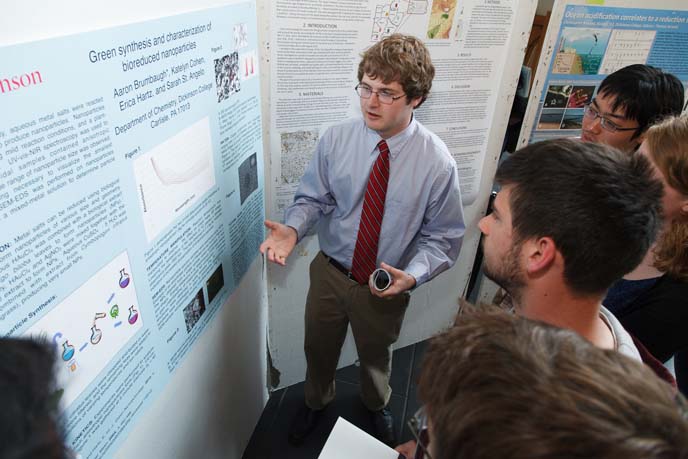Sustainable Science

Aaron Brumbaugh '14 describes original research during the 2013 Science Student Symposium. Photo by Carl Socolow '77.
by MaryAlice Bitts-Jackson
Biochemistry & molecular-biology major Aaron Brumbaugh '14 had never taken a nanoscience course and was not considering a career in the field. But when he learned about Assistant Professor of Chemistry Sarah St. Angelo's nanochemistry-research project, it was simply too perfect to pass up.
"This project combined the two things I'm most passionate about—science and sustainability," Brumbaugh explains. "And I wanted to be engaged in the research. So I thought I'd give it a try."
Today, his instincts and hard work are paying off handsomely. Brumbaugh is preparing to accept the prestigious Green Chemistry Award at a national American Chemical Society (ACS) conference in New Orleans this spring that attracts approximately 10,000 researchers in a cutting-edge field. His trip will be funded by a $2,000 ACS Green Institute travel grant, and he will present original research at the conference.
A deepening dedication
An impassioned advocate of natural conservation, Brumbaugh says his interest in sustainability is rivaled only by his fascination by science; in fact, sustainability programming was an important factor in his college-selection process. Last year he took his commitment a bit further when he began to walk and bicycle more often to nearby destinations in a concerted effort to avoid driving whenever possible. He also helped others to learn sustainable practices through his work as an Eco Rep and an R.A.
Those experiences came into play when, as a sophomore with plans for medical school, Brumbaugh began to look for summer-research opportunities. When he learned about St. Angelo's work investigating ways to use natural processes and plant-based materials to generate resources without using or emitting materials that are hazardous to the environment, he was inspired to apply.
From tea leaves to metal
Throughout the summer, Brumbaugh and St. Angelo boiled finely chopped lemongrass leaves and stalks in water to make a soupy tea extract from which copper nanoparticles could be created. They also used gingko-tea leaves as capping and reducing agents to create mixed-metal nanoparticles (silver and gold).
They analyzed the way that the metals distributed in the nanoparticles, examining the dried droplets under a powerful electron microscope in Kaufman Hall, and also took a field trip to Penn State to sample that large research university's lab equipment. "The thing about working at the nano level is that you can get lost for hours in a couple of square millimeters," says St. Angelo. "It's really a lot of fun."
St. Angelo is continuing the research this fall and Brumbaugh hopes to continue the work in his senior year. "We still have a lot of work to do before we look for real applications," cautions St. Angelo, who hopes to publish within the year. "But since copper oxides are used for catalytics, the results are very encouraging."
Broadening options
Brumbaugh recently presented the findings at conference at Carnegie Mellon University. As he prepares his presentations in New Orleans, he looks forward to making contacts with top green chemists and learning about new advancements in the field. He also hopes to gather information about related graduate programs and career options, because while he's still interested in pursuing medicine, he's also now weighing the prospects of a green-research career.
Whatever path he selects, St. Angelo says, his dedication will serve him well. "It's one thing to do a summer-research project and become interested in the subject matter," she explains. "But it's another thing to really live out your passion through your work. That's what we all hope for, and it's very good to see.""The more I worked on this project over the summer, the more I realized that it was the right project for me," says Brumbaugh, adding that he genuinely enjoyed the research. "Every day you find new pieces to this puzzle, and that's invigorating."
Learn more:
Students as Scholars program
Sustainability at Dickinson
Published February 12, 2013